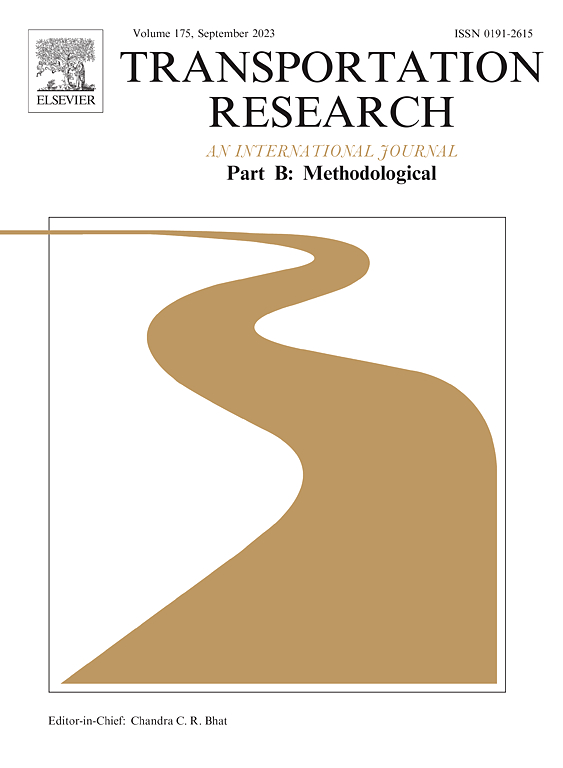列车生态驾驶问题的新公式与解决方法
IF 6.3
1区 工程技术
Q1 ECONOMICS
引用次数: 0
摘要
本文研究了列车生态驾驶问题的求解方法,包括经典的单列列车生态驾驶问题、中间时间窗约束的单列列车生态驾驶问题和绿波政策下的车队生态驾驶问题。后两个问题在现代繁忙的铁路网中尤为重要。针对经典单列生态驾驶问题,提出了一个松弛的连续最优控制公式,并严格证明了松弛的精确性。为了解决这个松弛的最优控制问题,我们采用直接法,将问题中的自变量离散化,并将问题转化为一个非线性程序,后者可以有效地求解到精确解。为了进一步提高计算效率,我们引入了非线性程序的有效不等式。通过数值实验验证了所提方法在求解质量和计算时间方面的性能,结果表明所提方法在求解经典单列生态驾驶问题方面优于基准直接方法。此外,我们将所提出的方法扩展到另外两个更复杂但实际的生态驾驶问题,并且我们所提出的方法可以在合理的计算时间内给出所制定的非线性非凸规划的精确解。本文章由计算机程序翻译,如有差异,请以英文原文为准。
New formulations and solution approaches for train eco-driving problems
This paper investigates solution methods for train eco-driving problems that include the classic single-train eco-driving problem, the single-train eco-driving problem with intermediate time-window constraints, and the eco-driving problem for a fleet of trains under the green-wave policy. The latter two problems are particularly relevant in modern, busy railway networks. We start from proposing a relaxed continuous optimal control formulation for the classic single-train eco-driving problem and rigorously prove that the relaxation is exact. To solve this relaxed optimal control problem, we use the direct method by discretizing the independent variable in the problem and converting the problem to a nonlinear program, where the latter can be effectively solved to exact solutions. To further enhance the computational efficiency, we introduce valid inequalities for the nonlinear program. Numerical experiments are conducted to demonstrate the performance of our proposed method in terms of solution quality and computing time, which shows that our proposed method outperforms benchmark direct methods in solving the classic single-train eco-driving problem. Furthermore, we extend our proposed method to solve the other two aforementioned more complicated but practical eco-driving problems, and our proposed method can deliver exact solutions for the formulated nonlinear nonconvex programs within reasonable computing time.
求助全文
通过发布文献求助,成功后即可免费获取论文全文。
去求助
来源期刊
CiteScore
12.40
自引率
8.80%
发文量
143
审稿时长
14.1 weeks
期刊介绍:
Transportation Research: Part B publishes papers on all methodological aspects of the subject, particularly those that require mathematical analysis. The general theme of the journal is the development and solution of problems that are adequately motivated to deal with important aspects of the design and/or analysis of transportation systems. Areas covered include: traffic flow; design and analysis of transportation networks; control and scheduling; optimization; queuing theory; logistics; supply chains; development and application of statistical, econometric and mathematical models to address transportation problems; cost models; pricing and/or investment; traveler or shipper behavior; cost-benefit methodologies.

 求助内容:
求助内容: 应助结果提醒方式:
应助结果提醒方式:


